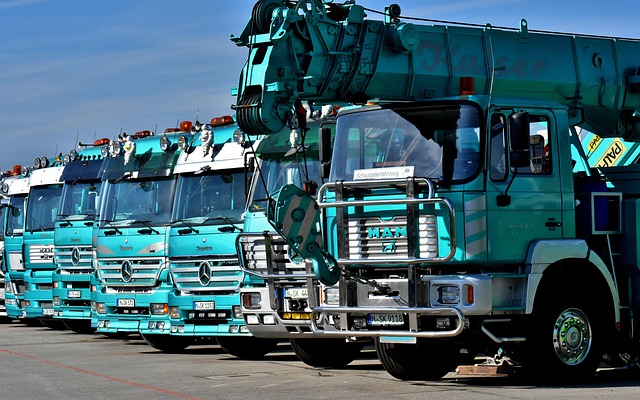Select Electric Trucks are revolutionizing trucking with advanced technology and sustainability benefits, offering zero-emission engines, improved efficiency, longer hauls, cost savings, and reduced environmental impact, driving a green future in transportation.
In today’s rapidly evolving transportation landscape, select electric trucks are leading the charge towards sustainability and efficiency. This article explores the burgeoning world of high-performance electric semi-trucks, their remarkable capabilities, and profound implications for the logistics industry. From unlocking unprecedented efficiency to revolutionizing supply chains, these game-changers are transforming the way we move goods. Discover the key features driving their success and future trends shaping the electric truck selection process.
- Unlocking Efficiency: The Rise of High-Performance Electric Semis
- Key Features: What Makes Them Stand Out?
- Benefits for Logistics: Revolutionizing the Industry
- Future Prospects: Trends Shaping Electric Truck Selection
Unlocking Efficiency: The Rise of High-Performance Electric Semis

The future of trucking is here with the advent of high-performance electric semi trucks. These advanced vehicles are revolutionizing the transportation industry by offering unprecedented efficiency and sustainability. As the demand for greener and more cost-effective solutions grows, select electric trucks are emerging as a powerful alternative to conventional diesel-powered haulers. By harnessing cutting-edge technology, these electric semis promise to transform long-haul trucking, making it quieter, cleaner, and more environmentally friendly.
The rise of high-performance electric semis is not just about reducing carbon emissions; it’s also about unlocking efficiency gains. These vehicles boast advanced battery systems and powerful electric motors, enabling them to travel longer distances with fewer stops for recharging. Moreover, the integration of renewable energy sources, such as solar-powered haulers, further enhances their eco-friendly credentials. This shift towards an environmentally friendly fleet not only contributes to carbon footprint reduction but also offers significant cost savings for trucking companies through lower operational expenses and reduced dependency on fossil fuels.
Key Features: What Makes Them Stand Out?

High-performance electric semis are transforming the transportation industry with their advanced technology and sustainability benefits. These vehicles offer a unique blend of power, efficiency, and eco-friendliness that sets them apart from traditional diesel models. One of the key features making them stand out is their zero-emission engines, significantly reducing carbon footprints on the road. This not only contributes to cleaner air but also lowers operational costs for fleet operators by eliminating fuel expenses and maintenance linked to internal combustion engines.
When considering the best electric trucks, several advanced technologies contribute to their performance. Regenerative braking systems capture energy typically lost during deceleration, enhancing battery efficiency. Smart infotainment systems and driver assistance features ensure a seamless and safe driving experience. Moreover, electric semi-trucks for sale often come with customizable configurations, making them suitable for various industries and applications, including long-haul logistics and urban delivery services. As the demand for sustainable transportation grows, electric vehicles for hire are becoming increasingly popular, offering businesses and consumers alike a viable alternative to conventional fuel sources.
Benefits for Logistics: Revolutionizing the Industry

The adoption of high-performance electric semi-trucks is a game-changer for the logistics industry, marking a significant shift towards sustainability and efficiency. One of the key benefits is the reduction in environmental impact. These electric trucks are an essential step towards creating an environmentally friendly fleet, offering a greener alternative to traditional diesel vehicles. With zero tailpipe emissions, they contribute to cleaner air and help combat climate change, making them a sustainable choice for forward-thinking businesses.
Additionally, electric mobility revolutionises the way logistics operations are managed. These trucks can significantly lower operational costs due to reduced fuel expenses and simpler maintenance requirements compared to their internal combustion engine counterparts. This efficiency gains are especially notable in dense urban areas where delivery routes are often complex, making electric trucks a practical and cost-effective solution for last-mile deliveries.
Future Prospects: Trends Shaping Electric Truck Selection

The future of electric trucks looks bright, with several trends shaping the way we select electric vehicles for commercial use. One key trend is the increasing focus on low emission transportation and environmentally friendly cargo transport. As regulatory bodies worldwide tighten emissions standards, businesses are turning to electric semis as a sustainable solution. This shift not only benefits the environment but also reduces operating costs for carriers over time.
Another significant aspect is the continuous improvement in electric battery range comparison. Advances in battery technology are allowing electric trucks to travel further on a single charge, addressing a major concern among potential buyers. With extended ranges and faster charging times becoming the norm, more fleets are expected to adopt electric semis, contributing to a greener and quieter transportation network.
High-performance electric semis are not just a glimpse into the future; they are transforming the logistics industry today. Unlocking unprecedented efficiency and environmental benefits, these trucks offer a compelling case for businesses looking to adopt greener practices without compromising on performance. As technology advances and demand grows, selecting electric trucks will become an increasingly smart choice for a sustainable and prosperous future. By embracing these innovations, the transportation sector can navigate towards a more eco-friendly and economically viable path.
